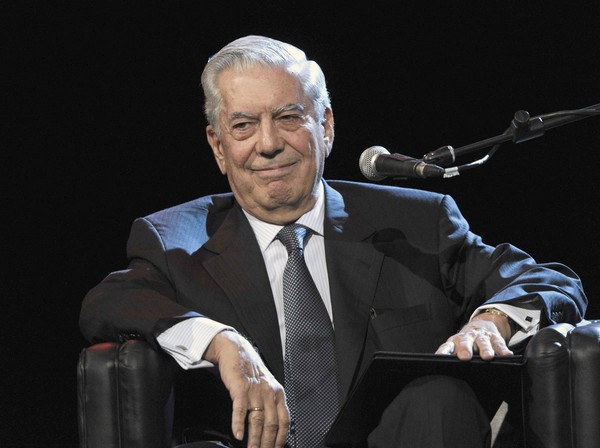
(above) Peruvian novelist and Nobel laureate Mario Vargas Llosa is seen at the Buenos Aires' International Book Fair in April. Vargas Llosa has backed leftist Ollanta Humala against Keiko Fujimori, daughter of disgraced former President Alberto Fujimori, in the presidential runoff race. (Photo: Juan Mabromata / AFP/Getty Images / April 21, 2011)
Peruvian Nobel laureate Vargas Llosa lashes out at news group
June 2, 2011 - Los Angeles Times
The acclaimed novelist withdraws his columns from the leading daily El Comercio, accusing its owners of blatantly promoting Keiko Fujimori in the coming presidential runoff. He supports her rival, Ollanta Humala, a leftist.
By Tracy Wilkinson, Los Angeles Times
Reporting from Lima, Peru—
He could be a character in one of his novels, a doomed figure swiping at the structures of power. Nobel laureate Mario Vargas Llosa has waded into the stormy waters of his home country's election politics, again, and he seems to be at war with everyone.
In the latest skirmish, the acclaimed Peruvian novelist this week angrily withdrew his columns from Lima's leading daily newspaper, El Comercio. He did so with some rather scathing words. El Comercio, he said, has become a "propaganda machine" for Keiko Fujimori, a controversial candidate in Sunday's presidential runoff election.
And as such, the newspaper "violates daily the most elemental notions of journalistic objectivity and ethics," he said in a letter to El Comercio's executives. The paper's venerated late publisher, Luis Miro Quesada, would be rolling over in his grave to see "the abject levels" to which El Comercio had sunk, the novelist said.
Vargas Llosa, of course, supports the other candidate, the also controversial Ollanta Humala. The writer charges that Fujimori, daughter of jailed former President Alberto Fujimori, represents a serious threat to democracy.
He has also bickered bitterly and very publicly with the head of the Roman Catholic Church in Peru, Cardinal Juan Luis Cipriani, who is thought to support Fujimori. Vargas Llosa called Cipriani a "spokesman for dictatorship" who represents the "worst tradition" of the church, starting with the Inquisition.
And the famously right-wing writer has exasperated some of his old friends, because Humala is a leftist.
Many Peruvians think this is all personal: Vargas Llosa was defeated in his own run for president in 1990 by none other than the elder Fujimori.
But the dispute goes beyond that. The spat with El Comercio underscores how polarized Peru has become ahead of this runoff election, and the extent to which local media appear to have taken sides.
Most Peruvian media are concentrated in a few hands. The people who own El Comercio also have controlling stakes in a couple of television channels. One of them, cable Channel N, recently fired two producers for what colleagues say was their attempt to give equal airtime to Humala, at Keiko Fujimori's expense.
And when Humala held a highly promoted "oath-taking" ceremony in which he pledged to obey the constitution (meant to dispel fears that he's a mini-clone of radical Venezuelan President Hugo Chavez), most news media covered it. But Channel N, even though it had a reporter at the ceremony, instead aired a show with Lady Gaga.
That was too much for Channel N news anchor Josefina Townsend.
"It was a decision that did not dispel the doubts" about the channel's objectivity, she said on the air, noting the large number of complaints the company had received. "I too was surprised," she told viewers.
In an interview, Townsend said she and other journalists at the station were struggling to provide balanced coverage.
Humala, a former military officer, has frightened much of Peru's elite with his talk of economic redistribution. That has pushed many prominent people into Keiko Fujimori's camp, despite widely held suspicion that her much-discredited father is really behind her candidacy.
Vargas Llosa, who was awarded the Nobel Prize for literature last year, writes a weekly column, Piedra de Toque ("Touchstone"), which appears first in the Spanish daily El Pais and is then reprinted in El Comercio and other newspapers.
In his letter quitting El Comercio, he was especially critical of Martha Meier Miro Quesada, the de facto editor of the paper and a known supporter of Fujimori. She in turn has been highly critical of Vargas Llosa's son, Alvaro, who is campaigning for Humala. An effort to have a talk show hosted by Mario Vargas Llosa on Channel N that would ostensibly provide balance was quashed by El Comercio stockholders, people familiar with the deal said.
El Comercio "silences and manipulates information, distorts facts, opens its pages to lies and slander to damage the opponent [Humala]," Vargas Llosa wrote, "all the while firing or intimidating independent journalists, resorting to the lowest and most insidious blows."
Responding to Vargas Llosa, El Comercio on Wednesday rejected his "malicious, unfounded" claims aimed at discrediting the paper, and noted that his opinions had always been respected and published.
"In the current polarized and tense political climate," wrote El Comercio Editor Francisco Miro Quesada, "it is inopportune and painful that political interests have been unleashed in a letter full of lies.
"El Comercio emphatically rejects unfounded statements from a figure from whom one would expect a behavior fitting the circumstances that Peru today requires."
wilkinson@latimes.com